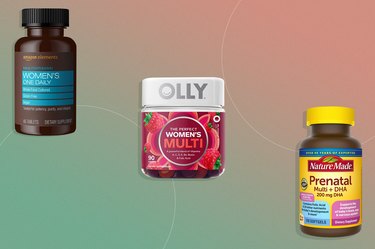
The little-known thymus gland, located in your chest, plays an outsize role in how well your immune system functions. It produces the mighty T cells, which are one of the immune system's main weapons against threats as far ranging as COVID-19 and cancer.
"The thymus is this unknown pulse that regulates our immune system and dictates the battlefield for any anticipated infection," says M. Elizabeth Swenor, DO, head of Lifestyle Integrative and Functional Medicine (LIFE) at Henry Ford Health System in Detroit.
Video of the Day
Video of the Day
In other words, it makes sure the immune system is in fighting shape even before any threats appear.
What Is the Function of the Thymus?
The thymus is a vital organ that begins developing before birth, and its function peaks between ages 7 and 25. By the time you reach puberty, it has already produced most of your body's T cells, which help protect the body from infection.
"It is the only organ that is larger when you are a child and slowly shrinks after puberty," explains Eric Ascher, DO, a family medicine physician at Lenox Hill Hospital in New York City.
By the age of 75, the gland is mostly fatty tissue, which is one reason older people are more likely to get sick or less likely to respond to vaccinations, says Sonya Angelone, RDN, national spokesperson for the Academy of Nutrition and Dietetic.
The T cells produced by the thymus gland in the early life years are stored in lymph nodes, she adds, which are small, bean-shaped structures found throughout the body.
In general, what's good for the immune system is good for the thymus, and vice versa.
How to Keep Your Thymus Healthy

There are several steps you can take to improve the fnctioning of your thymus and strengthen your immune system.
1. Manage Stress
Stress isn't good for your immune system. Over time, it can contribute to inflammation, a corrosive process that can damage all aspects of health, including immunity and thymus gland function.
Not surprisingly, then, stress management is your immune system's friend, Dr. Swenor says. She recommends deep breathing exercises, which help control the sympathetic and parasympathetic nervous systems and decrease inflammation.
Other ways to manage stress include:
- Meditating
- Regular exercise
- Eating nutritious foods
2. Eat Thymus-Supportive Foods
Even before birth, a baby's gut microbiome starts communicating with the thymus, getting it into shape for a lifetime of immune help, says Dr. Swenor. This communication continues after birth, she notes, which is one of the reasons a balanced diet is so vital to combatting inflammation and maintaining immune health.
Starting in childhood, a broad plant-based diet that includes fruits and veggies — especially sulfur-based cruciferous vegetables (like broccoli, cauliflower, bok choy and Brussels sprouts) — is vital, Dr. Swenor says.
There's no specific food to support thymus health, says Angelone, but consuming "five to seven servings of vegetables every day — especially cruciferous vegetables like broccoli, cabbage and cauliflower — can help your immune system."
Current dietary guidelines recommend one and a half to two cups of fruits and two to three cups of vegetables each day.
And there are key vitamins and minerals that contribute to immune-system strength. These include:
- Vitamin A: Foods rich in vitamin A include red meats, goat cheese and other animal sources as well as orange fruits and veggies (think: carrots, pumpkin, sweet potatoes, cantaloupe, apricots) along with leafy green veggies.
- Vitamin C: This vitamin is famous for its infection-fighting prowess. Foods high in vitamin C include citrus fruits, strawberries, tomatoes, spinach and kale, Brussels sprouts, bell peppers and papaya. Both "beta-carotene (the precursor of vitamin A) and vitamin C are antioxidants and help squelch harmful free radical in the thymus gland that can inhibit thymus function," says Angelone.
- Vitamin D: This vitamin is unusual in that it's provided by the sun in addition to some food sources such as fatty fish (salmon, mackerel, tuna, sardines), egg yolks and fortified foods such as cereal and milk.
- Vitamin E: Vitamin E-rich foods include seeds and nuts (try almonds, hazelnuts, sunflower seeds, peanuts and peanut butter) as well as oils derived from vegetables (sunflower, safflower, soybean).
- Iron: mostly from red meat, poultry), fatty fish, clams, mussels, legumes, nuts, fortified cereal, broccoli and kale.
- Selenium: Selenium is mostly present in animal sources including meat and poultry, cottage cheese, seafood and — especially — Brazil nuts.
- Zinc: Zinc is important for the immune in that a zinc deficiency reduces the function of T cells and is associated with slower wound healing, says Angelone. Foods rich in zinc include meat (especially red meat), shellfish, legumes and pumpkin seeds, she adds.
3. Stimulate Your Thymus Gland With Exercise
Physical activity, another cornerstone of a generally healthy lifestyle, is good for immune function as well.
"By promoting blood flow, you allow nutrients transported throughout the body to land where they are needed most," says Dr. Ascher. "You remove products that are unnecessary as well."
Exercise also raises your body temperature, making it harder for infection-causing bacteria to linger. And it helps you sleep better, which is always a boost for the immune system, says Dr. Ascher.
Official guidelines suggest getting at least 150 minutes of moderate-intensity physical activity each week plus two days of muscle-strengthening activity, according to the Centers for Disease Control and Prevention.
4. Ask About Thymus-Supporting Supplements
Many vitamins and minerals, including those mentioned above, support immune health. In general, though, experts recommend that you get these nutrients from food rather than supplements.
"Substances in foods often have a synergistic effect with nutrients for maximum benefit," says Angelone.
See a health care professional to test for any micronutrient deficiencies before adding any supplements to your regimen, cautions Dr. Swenor. And bear in mind that over-the-counter supplements are not regulated the same way as drugs: You don't always know for sure what you're getting in terms of ingredients, quality or effectiveness.
"The best supplement of all is making a huge salad, reducing added sugars and processed foods and limiting animal-based foods," Dr. Swenor says.
If you get the go-ahead from your doctor or dietitian, a daily multivitamin should cover any nutritional gaps caused by most dietary restrictions or medical issues.
- Advances in Clinical and Experimental Medicine: “The Thymus: A Forgotten, But Very Important Organ”
- Fred Hutchinson Cancer Center: “How the immune system’s key organ regenerates itself”
- College of American Pathologists: “Case of the Month: Thymus”
- Mayo Clinic: “Thymus gland
- Mayo Clinic: “Support your immune function with good nutrition”
- Cleveland Clinic: “8 Vitamins & Minerals You Need for a Healthy Immune System”
- Academy of Nutrition and Dietetics: “The Beginner's Guide to Cruciferous Vegetables”
- Centers for Disease Control and Prevention: “How much physical activity do adults need?”
- Harvard T.H. Chan School of Public Health: "Science of Flavor: Cruciferous Vegetables"
Is this an emergency? If you are experiencing serious medical symptoms, please see the National Library of Medicine’s list of signs you need emergency medical attention or call 911.








